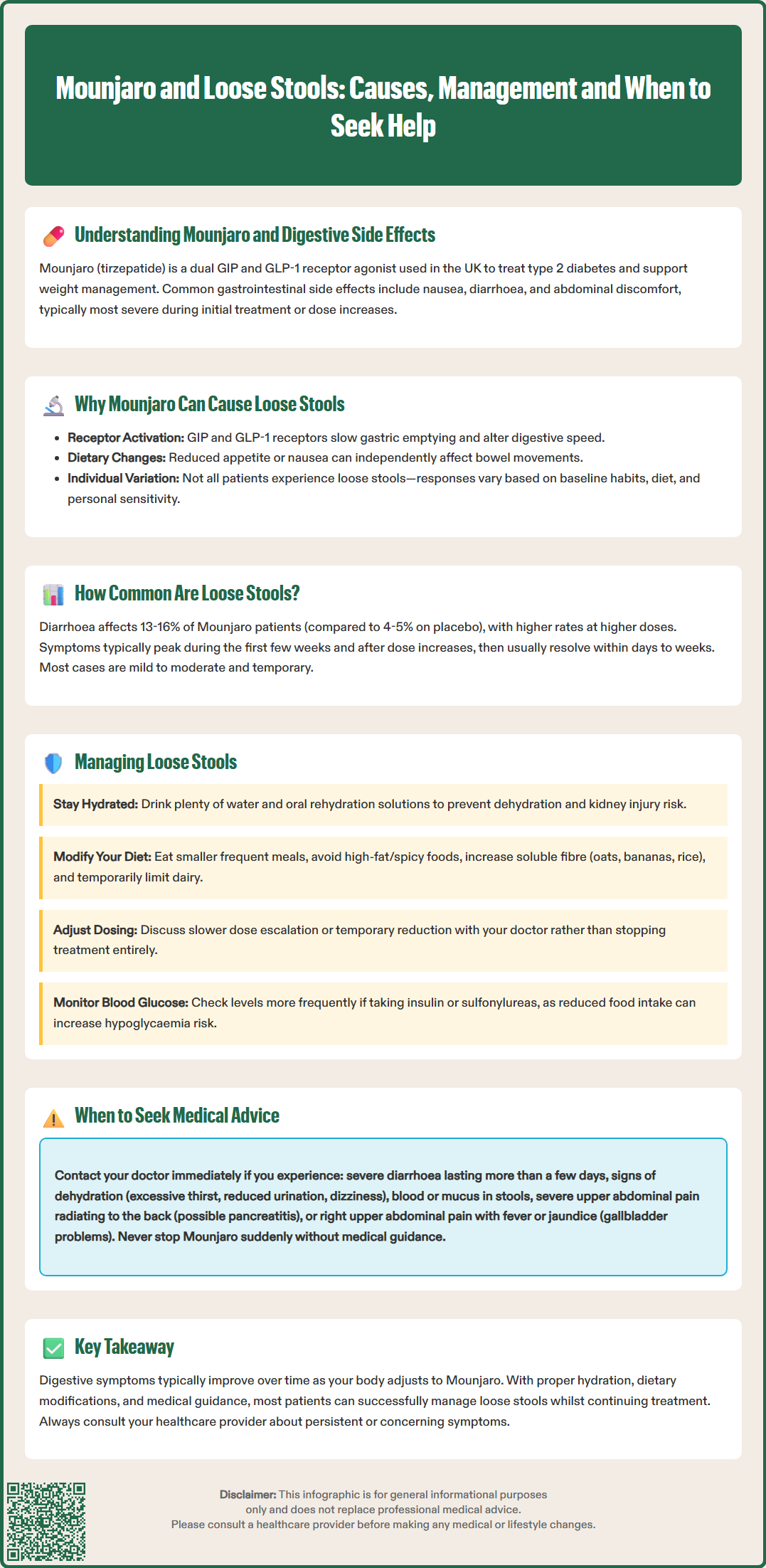
Mounjaro (tirzepatide) is a dual GIP and GLP-1 receptor agonist licensed in the UK for type 2 diabetes and weight management. Whilst highly effective for glycaemic control and weight reduction, Mounjaro and loose stools are commonly linked, with diarrhoea reported as a very common side effect. These gastrointestinal symptoms typically occur during initial treatment or dose escalation and often improve as the body adapts. Understanding why loose stools occur, how to manage them, and when to seek medical advice helps patients maintain treatment adherence whilst minimising discomfort and ensuring safety.
Quick Answer: Loose stools are a very common side effect of Mounjaro (tirzepatide), occurring in approximately 1 in 10 patients, typically during initial treatment or dose increases.

Mounjaro® is the most innovative GLP-1 medication proven to dramatically curb appetite, hunger, and cravings to help professional men achieve substantial weight loss.
Start Here
Wegovy® is a weekly injectable GLP-1 medication with proven effectiveness in reducing appetite, hunger, and cravings to help busy professionals lose significant weight.
Start HereMounjaro (tirzepatide) is a prescription medicine licensed in the UK for the treatment of type 2 diabetes mellitus and, more recently, for weight management in adults with obesity or overweight with weight-related comorbidities. It belongs to a class of medications known as dual glucose-dependent insulinotropic polypeptide (GIP) and glucagon-like peptide-1 (GLP-1) receptor agonists. By mimicking the action of these naturally occurring gut hormones, Mounjaro helps regulate blood glucose levels, reduces appetite, and slows gastric emptying.
Whilst Mounjaro has demonstrated significant clinical benefits in glycaemic control and weight reduction, it is associated with a range of gastrointestinal side effects. These are amongst the most commonly reported adverse reactions and can affect patient adherence to treatment. Digestive symptoms include nausea, vomiting, constipation, abdominal discomfort, and notably, loose stools or diarrhoea .
The gastrointestinal side effects of Mounjaro are generally dose-dependent and tend to be most pronounced during the initial weeks of treatment or following dose escalation. For many patients, these symptoms diminish over time as the body adapts to the medication. However, persistent or severe digestive disturbances warrant medical review to exclude other causes and to optimise management strategies.
It's important to note that Mounjaro carries warnings for rare but serious gastrointestinal complications, including pancreatitis, gallbladder disease, and intestinal obstruction. Patients should maintain adequate hydration, particularly if experiencing diarrhoea, to reduce the risk of acute kidney injury. Those taking insulin or sulfonylureas alongside Mounjaro may need closer glucose monitoring and dose adjustments if digestive symptoms reduce food intake, as this could increase hypoglycaemia risk.

The exact mechanism by which Mounjaro causes loose stools is not fully understood but appears to relate to its pharmacological action on the gastrointestinal tract. As a GIP and GLP-1 receptor agonist, tirzepatide influences gut motility and the overall digestive process. GLP-1 receptor activation slows gastric emptying, which can alter the normal transit time of food and fluids through the digestive system. These changes in gastrointestinal motility may contribute to changes in bowel habits, including both constipation and, in some individuals, diarrhoea.
The effects of tirzepatide on gastrointestinal function are complex and may involve multiple pathways. Changes in gastric emptying and intestinal transit can influence digestive processes, potentially affecting stool consistency. Additionally, dietary changes often accompany Mounjaro treatment—patients may alter their eating patterns or food choices in response to reduced appetite or nausea, and these dietary modifications can independently affect bowel movements.
According to the MHRA-approved Summary of Product Characteristics (SmPC), gastrointestinal disorders are very common with tirzepatide treatment. The European Medicines Agency's European Public Assessment Report (EPAR) for Mounjaro notes that these effects are consistent with the known class effects of GLP-1 receptor agonists.
It is important to note that whilst loose stools are a recognised side effect, they are not experienced by all patients. The incidence and severity vary between individuals, influenced by factors such as baseline bowel habits, diet, concurrent medications, and individual sensitivity to the drug.
Diarrhoea and loose stools are among the frequently reported gastrointestinal side effects of Mounjaro. According to the MHRA-approved Summary of Product Characteristics (SmPC), diarrhoea is classified as a 'very common' adverse reaction, occurring in ≥1/10 patients. The frequency varies by dose, with higher rates generally observed at higher doses.
In the pivotal SURPASS clinical trial programme for type 2 diabetes, diarrhoea was reported in approximately 13-16% of patients across different doses, compared to 4-5% in placebo groups. In the SURMOUNT trials for weight management, similar patterns were observed. The frequency tends to be highest in the first few weeks of treatment and following each dose increase. Most cases are mild to moderate in severity and resolve spontaneously within days to weeks as the body adjusts to the medication.
Severe or persistent diarrhoea is less common but does occur in a small proportion of patients, sometimes necessitating dose reduction or temporary treatment interruption. The European Medicines Agency's assessment report notes that gastrointestinal adverse events were the most common reason for treatment discontinuation in clinical trials.
Gastrointestinal effects, including diarrhoea, are a recognised class effect of GLP-1 receptor agonists. The rates observed with different medications in this class are broadly similar, though direct comparisons are limited by the absence of large head-to-head trials.
Patients should be informed that experiencing loose stools does not necessarily indicate a problem with the medication or their health, provided the symptoms are manageable and not accompanied by concerning features such as blood in the stool, severe abdominal pain, or signs of dehydration. Open communication with healthcare providers is essential to monitor symptoms and adjust treatment as needed.
Effective management of loose stools whilst taking Mounjaro involves a combination of lifestyle modifications, dietary adjustments, and, when necessary, symptomatic treatment. Patients are encouraged to adopt strategies that support digestive health and minimise discomfort.
Dietary modifications can be particularly helpful. Patients should aim to:
Stay well hydrated by drinking plenty of water and oral rehydration solutions if needed, especially if stools are frequent or watery. This is particularly important for older adults or those with kidney disease, as dehydration can increase the risk of acute kidney injury.
Eat smaller, more frequent meals rather than large portions, which can be easier on the digestive system.
Avoid foods that may exacerbate diarrhoea, such as high-fat, spicy, or heavily processed foods, caffeine, and artificial sweeteners (e.g., sorbitol).
Increase soluble fibre intake gradually, through foods like oats, bananas, and rice, which can help bulk up stools.
Limit dairy products temporarily if lactose intolerance is suspected or if dairy worsens symptoms.
Medication adjustments may also be considered. If loose stools are troublesome, patients should discuss with their GP or diabetes specialist whether a slower dose escalation or a temporary dose reduction might be appropriate. The standard tirzepatide titration schedule starts at 2.5mg weekly, increasing gradually as tolerated, according to the SmPC.
Over-the-counter antidiarrhoeal agents, such as loperamide (Imodium), may provide short-term relief for mild to moderate symptoms. However, these should only be used after consulting a healthcare professional or pharmacist, and should not be used if there is blood in the stool, high fever, or suspected infection. If symptoms persist beyond 48 hours despite loperamide, medical advice should be sought.
Patients taking insulin or sulfonylureas alongside Mounjaro should monitor their blood glucose more frequently if digestive symptoms reduce food intake, as this could increase the risk of hypoglycaemia. They should discuss potential dose adjustments with their healthcare team.
Keeping a symptom diary can help identify patterns or triggers and facilitate more informed discussions with healthcare professionals about ongoing management. Patients should report suspected side effects to the MHRA Yellow Card Scheme (yellowcard.mhra.gov.uk).
Whilst loose stools are a common and generally manageable side effect of Mounjaro, certain symptoms warrant prompt medical attention. Patients should contact their GP or healthcare provider if they experience:
Severe or persistent diarrhoea lasting more than a few days, especially if it does not improve with dietary changes or over-the-counter remedies. Diarrhoea lasting ≥4 weeks is classified as chronic and requires investigation according to NICE and British Society of Gastroenterology guidelines.
Signs of dehydration, including excessive thirst, dry mouth, reduced urine output, dizziness, or lightheadedness.
Blood or mucus in the stools, which may indicate inflammation, infection, or other gastrointestinal pathology.
Severe abdominal pain or cramping, particularly if localised or accompanied by fever.
Symptoms suggestive of pancreatitis, such as severe, persistent upper abdominal pain radiating to the back, nausea, and vomiting. Although rare, pancreatitis is a recognised serious adverse effect of GLP-1 receptor agonists.
Signs of gallbladder disease, including right upper quadrant pain, fever, or jaundice (yellowing of the skin or eyes).
Symptoms of intestinal obstruction or ileus, such as severe abdominal pain, persistent vomiting, abdominal distension, or constipation.
For severe symptoms, patients should contact NHS 111 or, in emergencies (such as suspected pancreatitis, severe dehydration, or acute abdomen), call 999 or go to A&E.
Investigations for persistent diarrhoea may include blood tests (full blood count, kidney function, coeliac serology), stool cultures, C. difficile testing if relevant, and faecal calprotectin to screen for inflammatory bowel disease. Referral to a gastroenterologist may be necessary based on these results.
Patients should never stop Mounjaro abruptly without medical advice, particularly if it is being used for diabetes management, as this could affect glycaemic control. Open dialogue with healthcare providers ensures that any concerns are addressed promptly and that treatment remains safe and effective.
Suspected adverse reactions should be reported to the MHRA Yellow Card Scheme (yellowcard.mhra.gov.uk).
Loose stools typically occur during the first few weeks of Mounjaro treatment or following dose increases, with most cases resolving within days to weeks as the body adapts to the medication.
Over-the-counter loperamide may provide short-term relief for mild to moderate symptoms, but should only be used after consulting a healthcare professional or pharmacist, and not if blood is present in stools or infection is suspected.
Never stop Mounjaro abruptly without medical advice, particularly for diabetes management. Contact your GP or healthcare provider to discuss symptoms, as dose adjustment or temporary interruption may be appropriate rather than complete cessation.
All medical content on this blog is created based on reputable, evidence-based sources and reviewed regularly for accuracy and relevance. While we strive to keep content up to date with the latest research and clinical guidelines, it is intended for general informational purposes only.
DisclaimerThis content is not a substitute for professional medical advice, diagnosis, or treatment. Always consult a qualified healthcare professional with any medical questions or concerns. Use of the information is at your own risk, and we are not responsible for any consequences resulting from its use.